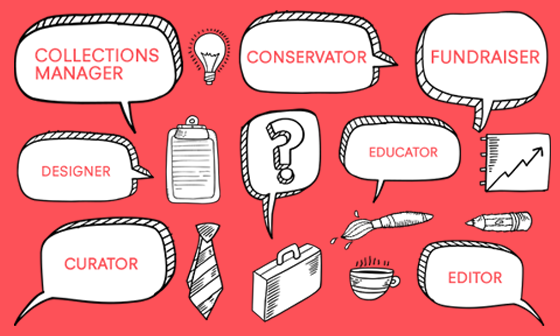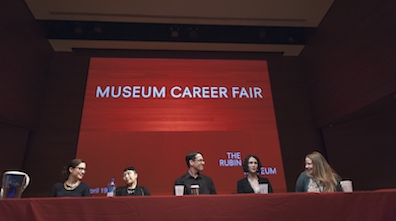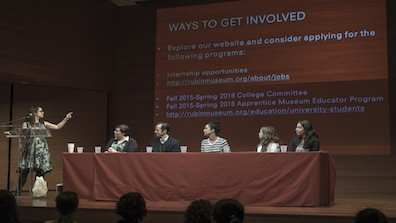
Every year, current university students and recent grads are invited to attend the Rubin Museum’s Museum Career Workshop, where their biggest career questions are answered by Museum staff members and guest speakers. Think you might be interested in attending? Check out these top eight tips from previous years’ panels and join us for our 2017 Museum Career Workshop on April 7:
1) Get involved.
Volunteering or interning at a museum, gallery, or other cultural organization will help you build skills and experience, as well as find a role that appeals to you. Remember, finding out what you don’t want to do can be just as valuable as discovering your dream job.
2) Network.
If you have volunteered at an organization previously, stay in touch to see how you can stay involved. Invite an old colleague out to coffee and catch up; you never know when inspiration will strike.
3) Investigate Behind the Scenes.
It takes a village to make any organization come together. Curation and education jobs are in the public eye, but there are many opportunities behind the scenes. Look into vital, less-visible positions, including public programming, fundraising, marketing and communications, finance, collections management, facility management, visitor experience, and more.
4) There is no standard degree or career path.
Do you want to design exhibitions? How about conserving artworks or working with children? Museums employ staff with a variety of academic degrees, professional training, and work experience. If you have an idea of the type of job you want, read job descriptions and see what kind of educational and/or experiential requirements are essential. Keep in mind that not every position is the same; there will be a variety of standards and expectations.
5) Focus on your potential – not someone else’s.
Paychecks are important, but remember to apply to jobs that make sense for you. Are you applying for an organization you’d want to work for? Maybe the organization is a fit, but does the work you’d be doing there actually interest you? Could a less exciting job build skills that you could take to a higher position later? Consider positions that appeal to both your goals and your budget.
6) It’s about the people.
Your career is more than the sum of your day-to-day tasks. You will be spending forty hours every week with your co-workers—sharing a common mission and being a part of a community is both important and inspiring.
7) Don’t give up.
So, you’ve sent three dozens of cover letters and haven’t had a single interview. Keep going! Sometimes you find a job or internship quickly, and sometimes it is a slog. If you feel stuck, take the time to reflect on what you can do to make yourself a more competitive candidate—revise your cover letter, volunteer to get more experience, or reach out to a mentor or talk to a professor for fresh ideas.
8) Where can I look for opportunities?
For one, continue your career journey at the Rubin and attend our upcoming Career Workshop. If you can’t make it, there are many other places to look for networking, volunteering, and employment information. Here are some of our favorites:
- New York Foundation for the Arts
- Indeed
- New York Museum Educators Roundtable
- College Arts Association
- ArtTable
- American Alliance of Museums
- International Council of Museums
- You should also check the “careers” webpage of your favorite institutions (click here to visit ours).
Add Your Thoughts
Comments are moderated, and will not appear on this site until the Rubin has approved them.



